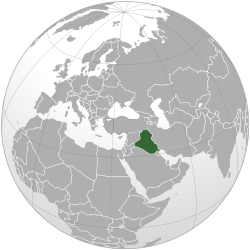Kingdom of Iraq (1932–1958)
| Kingdom of Iraq | ||||||||||
|
المملكة العراقية al-Mamlakah al-‘Irāqiyyah شانشينى عێراق Shanshani Iraq |
||||||||||
|
||||||||||
|
||||||||||
|
Anthem None Royal anthem السلام الملكي As-Salam al-Malaki The Royal Salute |
||||||||||
| Capital | Baghdad | |||||||||
| Languages |
Arabic Assyrian Kurdish |
|||||||||
| Religion |
Islam (Shia version predominant) · Christianity Judaism · Yazidism Mandaeism |
|||||||||
| Government | Constitutional monarchy | |||||||||
| King | ||||||||||
| • | 1932–1933 | Faisal I | ||||||||
| • | 1933–1939 | Ghazi | ||||||||
| • | 1939–1958 | Faisal II | ||||||||
| Prime Minister | ||||||||||
| • | 1920-1922 | Abd Al-Rahman Al-Gillani (first) | ||||||||
| • | 1958 | Ahmad Mukhtar Baban (last) | ||||||||
| Historical era | Interwar period, World War II, Cold War | |||||||||
| • | Independence from United Kingdom | 3 October 1932 | ||||||||
| • | Coup d'état | 1 April 1941 | ||||||||
| • | Baghdad Pact | 24 February 1955 | ||||||||
| • | Monarchy abolished | 14 July 1958 | ||||||||
| Area | ||||||||||
| • | 1958 | 438,317 km² (169,235 sq mi) | ||||||||
| Population | ||||||||||
| • | 1958 est. | 6,488,000 | ||||||||
| Density | 14.8 /km² (38.3 /sq mi) | |||||||||
|
||||||||||
| Warning: Value specified for "" | ||||||||||
The Kingdom of Iraq (Arabic: المملكة العراقية al-Mamlakah al-‘Irāqiyyah) was founded on 23 August 1921 under British administration following the defeat of the Ottoman Empire in the Mesopotamian campaign of World War I. Although a League of Nations mandate was awarded to Britain in 1920, the 1920 Iraqi revolt resulted in the scrapping of the original mandate plan in favor of a British administered semi-independent kingdom, under the Hashemite allies of Britain, via the Anglo-Iraqi Treaty. The kingdom of Iraq was granted full independence in 1932, following the Anglo-Iraqi Treaty (1930). The independent Iraqi Kingdom under the Hashemite rulers underwent a period of turbulence through its entire existence. Establishment of Sunni religious domination in Iraq was followed by Assyrian, Yazidi and Shi'a unrests, which were all brutally suppressed. In 1936, the first military coup took place in the Kingdom of Iraq, as Bakr Sidqi succeeded in replacing the acting Prime Minister with his associate. Multiple coups followed in a period of political instability, peaking in 1941.
During World War II, the Iraqi regime of Regent 'Abd al-Ilah was overthrown in 1941 by the Golden Square officers, headed by Rashid Ali. The short-lived pro-Nazi government of Iraq was defeated in May 1941 by the allied forces in the Anglo-Iraqi War. Iraq was later used as a base for allied attacks on the Vichy-French-held Mandate of Syria and support for the Anglo-Soviet invasion of Iran. At the same time, the Kurdish leader Mustafa Barzani led a rebellion against the central government in Baghdad. After the failure of the uprising Barzani and his followers fled to the Soviet Union.
...
Wikipedia



